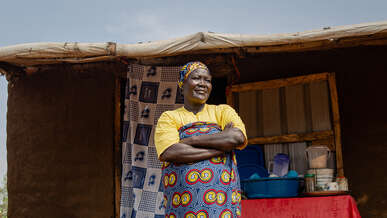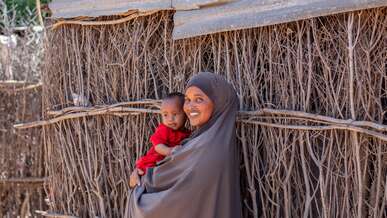The IRC and the IKEA Foundation have created Re:Build (short for Refugees in East Africa: Boosting Urban Innovations for Livelihoods Development), a five-year €30 million (approximately $31.5 million) initiative that will provide livelihood support to 20,000 people in Nairobi, Kenya and Kampala, Uganda. We have partnered with the Center for Global Development, Open Capital, Kampala Capital City Authority and the Nairobi City County government along with other local authorities, businesses and community-led organizations to deliver services and support to Re:Build participants.
Refugees and vulnerable groups in host communities, like those with disabilities or mothers who are the sole providers for their households, face high levels of unemployment and limited access to financing. Re:Build supports participants with programs designed to help them access public services and increase their economic independence.
Re:Build provides business-skills training, apprenticeships and awards grants to entrepreneurs. Our program connects participants to job opportunities in sustainable industries and helps them access financial services like banking and micro-loans. We also work with city officials to verify refugees’ skills, since people who flee conflict often lack certificates.
By providing inclusive and sustainable opportunities to refugees and vulnerable members of their host communities, Re:Build promotes social cohesion, helps local businesses recruit skilled workers, and bolsters the local economy.

Re:Build has prioritized efforts to help vulnerable women become financially independent through training programs and opportunities to safely enter male-dominated industries in East Africa.
For example, in Kampala, Re:Build has worked with local officials and business owners to help refugee women become mechanics, welders, carpenters and plumbers.

Re:Build is committed to action as well as research. In collaboration with researchers from the Center for Global Development (CGD), Georgetown University, University of Rochester, Princeton University, the Economic Policy Research Center (EPRC) and other notable institutions worldwide, Re:Build embarked on two 18-month-long studies (Randomized Control Trials [RCTs]) involving approximately 4,000 Re:Build participants in July 2022.
These evaluations will help us understand how to best help urban refugees and their host communities build resilient small businesses. The studies will evaluate the effectiveness and impact of Re:Build services designed to support clients to start or grow their businesses. Additionally, the studies will assess the effectiveness of Re:Build strategies for improving social cohesion between urban refugees and members of their host communities.

Re:Build is working to build and share evidence on innovative, sustainable livelihoods solutions so that they can be adopted to support refugees and host residents in other cities beyond East Africa.
The program encourages leaders at the regional, national and global levels to adopt policies, like expanding refugee's access to financial services, work permits and driving permits, which improve the lives of refugees in urban settings. Re:Build also works with local businesses to support refugee livelihoods in their business plans.

“My life is better than before,” says, Sebastian Kampangu, a Congolese refugee and Re:Build participant who works in data analytics at a marketing firm in Nairobi. “I’m financially independent. I can buy food for my family and pay rent. I even have a Kenya Revenue Authority number for paying taxes to the government.”Sebastian Kampangu Mubulawa – Hallmark Marketing



